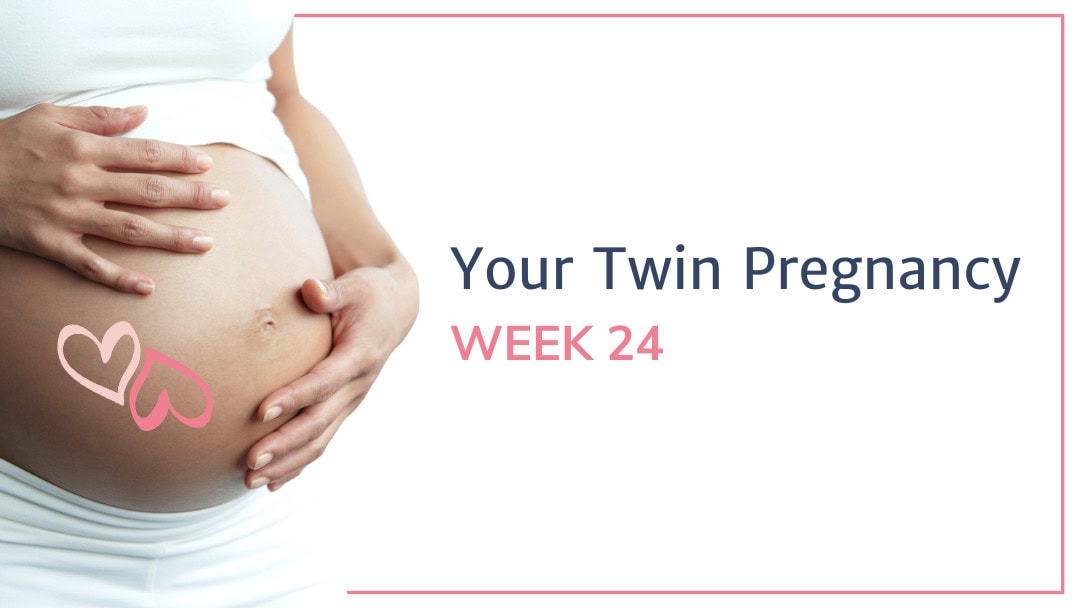Welcome to week 24 of your twin pregnancy mama! You’re officially entering the last few weeks of your second trimester, and your babies are growing faster than ever! But as your belly grows, so do those natural anxieties, especially about preterm labor.
Worrying about your babies arriving early is a common concern in twin pregnancies, so it’s perfectly normal if this is weighing on your mind. While learning about potential risks can be overwhelming, being prepared in advance can make all the difference if your little ones decide to arrive ahead of schedule.
This week, we’ll discuss the possibility of having your twins prematurely, how to recognize preterm labor, and what it means if your twins decide to make an early appearance.
We are here to support you, mama, but please ensure you talk with your OB/GYN or Doctor about any concerns you have about your twins arriving early and what you should be looking out for. Again, forearmed is forewarned. And as much information you have will help if you find yourself heading to the hospital slightly earlier than you had planned.
Read on to find out what those twins of yours are up to this week.

How are you feeling mama?
Twin Pregnancy Symptoms at 24 Weeks
How are you feeling this week mama? A little tired, no doubt.
This is because your babies have developed somewhat of a regular sleeping pattern. But they still don’t know their days from nights and are often awake at night, which unfortunately tends to lead to you being awake too, mama. Perhaps they are practicing for the months to come once they arrive.
Sleeping with extra pillows can definitely help, especially between your legs and under your tummy.
Have you felt any Braxton Hicks yet?
As your body starts preparing itself for labor, some moms feel an uncomfortable tightening of their belly. Others have sore muscles as a result of these fake contractions.
You will still be feeling your babies move. But you may have noticed the movement feels a little different from what it has done up until now.
Space is becoming a bit of a premium, and the area for them to move around in is getting smaller as they and you get bigger.
Sometimes you may even see a little hand or foot shape poking out from within your tummy. It makes a super cute video to look back on if you can grab your phone in time.
What are your twins up to this week?
Your Twins at 24 Weeks – Height & Weight
By week 24, your twins are each about the size of an ear of corn—around 12 inches long (30 cm) and weighing about 1.3 pounds (600 grams). While this might not sound like much, these tiny humans have come a long way! Their bodies are starting to fill out, and soon, they’ll be packing on the baby fat that will help regulate their body temperature after birth.
Identical twins tend to be more similar in size, but your doctor will be keeping an eye on their growth to ensure they’re developing equally.
Fraternal twins may be a little different in size by now, and that’s totally normal. One twin may be slightly bigger than the other, but as long as they’re both growing on their curve, there’s no need to worry.
Your Twins’ Fetal Development at 24 Weeks
Those gorgeous little faces that you will spend hours staring at are almost fully formed now (including eyelashes and eyebrows). Their cute button noses are also working, and they are spending time breathing and even picking up different scents!
This week marks an important milestone in your pregnancy because your twins are now considered viable. This means that if they were to be born now, they have a chance of survival outside the womb with medical intervention. While their little lungs aren’t quite fully developed, they’re working hard to practice breathing movements, inhaling amniotic fluid to strengthen those lungs. Here’s what else is going on:
Hearing: Your twins can hear your voice now! Talk, sing, and read to them—it’s a great way to bond, and they’ll recognize your voice once they’re born.
Lung development: Their lungs are still immature, but the tiny sacs (alveoli) inside the lungs are forming, which will eventually allow them to breathe on their own.
Brain development: Their brains are growing rapidly, and they’re starting to develop sleep-wake cycles, which means they may be moving around more when they’re awake.
What you might be wondering about this week
What if my twins come early?
It is impossible to go through a twin pregnancy without having a discussion with your pregnancy team about the risks of your twins arriving earlier than planned.
Around 50% of twin pregnancies will end before 36 weeks, so it is better to arm yourself with this possibility and spend some time reading up on how this might affect you and your babies.
You can read about some of the complications that can occur during a twin pregnancy in our article – Twin Pregnancy Complications.
If your twins do come early, then chances are they will need to spend some time in the neonatal unit (NICU).
Often, premature twins will require help with breathing, regulating their body temperature, and feeding until their little bodies are developed enough to venture out into the big wide world.
What Does ‘Premature’ Mean in a Twin Pregnancy?
Prematurity is a more common concern in twin pregnancies than in singleton pregnancies. While full-term pregnancy is considered to be 40 weeks, twins are typically born earlier—36 to 37 weeks on average.
Premature birth is defined as any birth that occurs before 37 weeks, but prematurity has different levels of severity:
- Late preterm: Babies born between 34 and 36 weeks.
- Moderate preterm: Babies born between 32 and 34 weeks.
- Very preterm: Babies born between 28 and 32 weeks.
- Extremely preterm: Babies born before 28 weeks.
Because twins often run out of room in the uterus earlier, it’s not unusual for twin moms to deliver before the full-term mark. That’s why your healthcare team is likely watching your pregnancy more closely and may perform more frequent ultrasounds or tests to monitor your twins’ growth and your risk of going into labor early.
Signs and Symptoms of Preterm Labor
As you approach the viability threshold at 24 weeks, knowing the signs of preterm labor becomes even more important. Preterm labor can sometimes be stopped if caught early enough, so recognizing the signs gives you a better chance of delaying delivery. Symptoms of preterm labor can include:
- Regular contractions: These can feel like menstrual cramps or back pain and typically occur at intervals. If you notice more than four contractions in an hour, even if they are not painful, contact your doctor.
- Low, dull backache: A persistent backache that comes and goes or is constant could be a sign of early labor.
- Pelvic pressure: An increase in pressure in your lower abdomen, pelvis, or vagina that feels unusual or more intense than what you’ve been experiencing may be concerning.
- Increased vaginal discharge: A watery, mucus-like, or bloody discharge could indicate your cervix is changing, which can be a sign of preterm labor.
- Cramping: Menstrual-like cramps that come and go or worsen could signal early contractions.
If you notice any of these symptoms, contact your healthcare provider immediately.
Preterm labor doesn’t always mean imminent delivery; medical intervention, such as bed rest, hydration, and medications, can sometimes delay labor.

What Happens If Your Twins Are Born at 24 Weeks?
At 24 weeks, your twins are considered micro-preemies if they’re born early. This is the point where they are now deemed viable, meaning they have a chance of survival outside the womb with intensive medical care. That being said, 24-weekers face significant challenges, including:
Survival rates: Survival rates for twins born at 24 weeks are around 60-70% but vary depending on individual circumstances and the care available at the NICU.
NICU stay: Babies born at 24 weeks typically spend several months in the Neonatal Intensive Care Unit (NICU), where they’ll receive specialized care. Since their organs aren’t fully developed, they will need help breathing, feeding, and regulating their body temperature.
Common health challenges: These can include respiratory distress syndrome (due to underdeveloped lungs), brain bleeds, infections, and developmental delays.
Thanks to medical advancements, the chances of survival have increased, and many micro-preemies go on to lead healthy lives, but it’s important to be aware of the potential challenges and long-term health issues that could arise from such an early birth.
How to Prepare for a NICU Stay with Twins
While no parent wants to imagine their babies spending time in the NICU, being prepared can make the experience a little easier. If there’s a possibility of preterm birth, planning for a NICU stay can help you feel more in control. Here’s how to prepare:
Familiarize yourself with the NICU: Ask your doctor if you can visit the NICU ahead of time or take a virtual tour. Knowing what the environment is like can help you feel less overwhelmed if your babies do need care there.
Understand NICU procedures: Learn about common NICU interventions such as ventilators, feeding tubes, and IVs. This knowledge can reduce the shock of seeing your babies hooked up to machines.
Create a support plan: NICU stays can be long and exhausting, so make sure you have a plan for emotional and logistical support. Lean on your partner, family, or friends for help with household tasks, meals, and emotional support.
Pack a NICU bag: If you suspect early labor, pack a small bag with essentials like toiletries, comfortable clothes, a journal, and snacks to help you get through long hospital days.
Your NICU journey may be a rollercoaster of emotions, but preparing yourself can ease the anxiety that comes with uncertainty.
Steroid Shots: What They Are and How They Help
If you’re at risk for preterm labor, your doctor may recommend corticosteroid injections to help your twins’ lungs develop faster. These shots are given between 24 and 34 weeks and are especially important if you are expected to deliver within the next seven days. Here’s how they help:
Accelerate lung development: Babies born prematurely often struggle with breathing due to underdeveloped lungs. Steroid shots stimulate the production of surfactant, a substance that helps the lungs expand and contract properly after birth.
Reduce complications: Steroid shots also reduce the risk of other complications related to prematurity, such as intraventricular hemorrhage (brain bleeds) and necrotizing enterocolitis (intestinal issues).
The shots are typically given in two doses, 24 hours apart, and are most effective when there are at least 24-48 hours between the second dose and delivery. If your healthcare provider suggests this treatment, it’s to give your babies the best chance at a healthier start if they’re born early.
Managing Anxiety About Having Your Twins Prematurely
Being worried about premature labor is completely understandable, especially with twins, but it’s important to remember that many pregnancies with early warnings of preterm labor still make it to later stages or even full-term. To help manage your anxiety:
Focus on what you can control: While you can’t change every outcome, you can control how well you take care of yourself. Eat well, stay hydrated, get plenty of rest, and follow your doctor’s advice.
Use relaxation techniques: Breathing exercises, meditation, or prenatal yoga can help calm your mind and body. These techniques are great for lowering stress and may even help delay preterm labor.
Talk to someone: Sharing your fears and concerns with your partner, a friend, or a counselor can ease the burden. Sometimes, just talking it out helps alleviate the anxiety.
Remember that your body was made for this, and while there are risks in every pregnancy, your healthcare team is keeping a close eye on you and your babies. Take it one day at a time.
Nutrition and Hydration: Supporting Your Body at 24 Weeks
Good nutrition and staying hydrated are always important in pregnancy, but they become even more critical as you approach the possibility of preterm labor. Eating well and drinking plenty of fluids can help keep your body strong and support your twins’ growth. Here are some tips:
Eat nutrient-dense foods: Focus on foods rich in protein, calcium, iron, and folate to help support your babies’ development and your own energy levels. Include lean meats, leafy greens, dairy, and whole grains in your diet.
Stay hydrated: Dehydration can trigger uterine contractions, so aim to drink at least 8-10 glasses of water each day. Keep a water bottle with you at all times to remind yourself to sip throughout the day.
Snack often: Eating smaller, more frequent meals can help prevent heartburn and keep your energy up. Try to snack on healthy options like fruits, nuts, or yogurt.
Cervical Length and Monitoring Preterm Risk
In twin pregnancies, doctors often monitor your cervical length to predict the risk of preterm labor. A shortening cervix can indicate that your body is preparing for labor. During an ultrasound, your doctor may measure the length of your cervix:
Normal length: A cervix that is over 1 inch (2.5 cm) long is considered normal at this 24-week stage.
Shortened cervix: If your cervix shortens below 1 inch (2.5 cm), your doctor may suggest strategies to reduce your risk of labor, such as bed rest or a cerclage (a procedure that stitches the cervix closed).
Regular monitoring helps your healthcare team stay ahead of any issues and respond quickly if your cervix starts to shorten.
Talking to Your Doctor About Prematurity Concerns
Talking with your healthcare provider is key when minimizing the risks of preterm birth in a twin pregnancy. Here are some helpful questions to ask at your next appointment:
- What can I do to reduce my risk of preterm labor?
- What are the signs of preterm labor that I should watch for?
- If I go into labor early, what is your plan for delivery and NICU care?
- Are there any treatments or interventions we should consider now to help prevent preterm labor?
Your doctor is your best resource, and having these conversations can help you feel more prepared and confident as you approach the third trimester.
Final thoughts…
Just remember that you are the most important person when it comes to caring for your twins, so don’t be afraid to ask the medical staff to help explain what they are doing and what you can do to help them too.
We have an entire section relating to premature twins and tips and advice if you find yourself in a neonatal unit with your twins.
READ MORE: Your Premature Twins.
We also asked a Neonatal Nurse Specialist what most parents wanted to know when their babies are staying in the NICU ward. Have a read about what they had to say in our blog post – Your Top 9 Questions About NICU Answered.
I hope you have found this week’s Twin Pregnancy guide informative and helpful. I know it’s not a fun topic to talk about, but it’s an important one, as early monitoring and intervention can often make such a difference.
I look forward to catching up again next week when we talk about planning for your twin’s birth day – so exciting!
Take care and much love.
P.S. Want to receive a reminder email to come back and read the next post in this Twin Pregnancy series? Register for our Twin Pregnancy & Preparing for Twins emails, and it will drop straight into your inbox.



